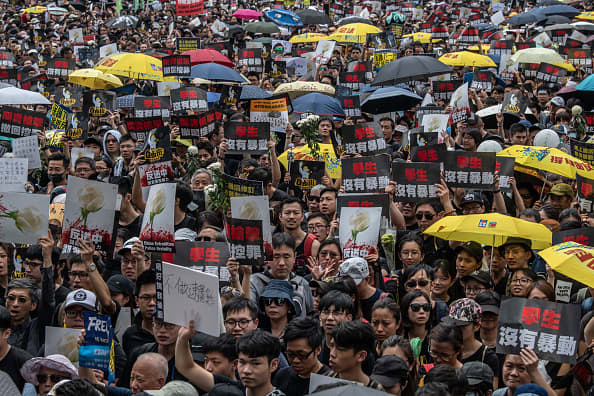Hits: 21

Protesters in Hong Kong demonstrate on June 16, 2019 against an extradition bill that has since been suspended.
Carl Court | Getty Images
Hong Kong‘s leader Carrie Lam said on Tuesday she is committed to completing her term despite massive protests calling for her resignation.
Lam, the territory’s chief executive, apologized during a televised appearance Tuesday, following days of angry mass protests against a proposed bill that would allow criminal extraditions to mainland China.
She said that if the government, through its continued efforts to communicate with the public on the legislation, fails to gain the confidence of the people, “we will not proceed with the legislative exercise again.”
Lam has found herself squeezed between Beijing’s desire to extend its influence over Hong Kong, and a local protest movement that has drawn very wide support.
On Saturday, Lam stoked anger when she announced that she would indefinitely suspend the extradition plan, but would not withdraw it.
She did not give a timeline on when the suspended bill might be relaunched during her Tuesday address — her first comments since a massive protest Sunday demanding her resignation and the complete withdrawal of the bill.
Pressure on Lam had mounted for weeks before Sunday’s demonstration that organizers said drew almost 2 million people. Police estimated there were 338,000 protesters, but said it was not a complete count.
Lam, who enters the third year of her five-year term in July, tried to assuage anger late Sunday with an apology issued through a government spokesman in a written statement. But that only intensified opposition anger. Protest organizers called it a “total insult.”
Lam and her government say Hong Kong needs to amend laws in order to extradite suspects to countries and jurisdictions with which the territory has no such arrangements.
But the inclusion of China in the plan raised fears in Hong Kong among citizens and businesses that they could become ensnared in China’s politically controlled judicial system.
Hong Kong was a British colony until 1997, when it became a special administrative region of the People’s Republic of China. Since then, many Hong Kong citizens have openly worried that they’re seeing freedoms they enjoyed under the British eroded under Beijing.
Be the first to comment